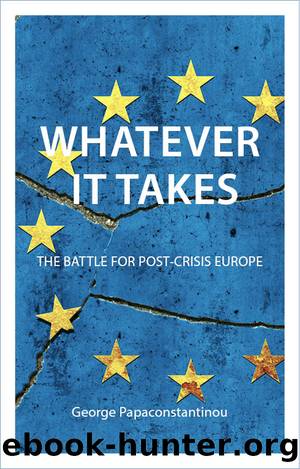Whatever It Takes by George Papaconstantinou;

Author:George Papaconstantinou;
Language: eng
Format: epub
Publisher: Book Network Int'l Limited trading as NBN International (NBNi)
Taking back control
Whilst for all EU countries, the domestic political debate has focused on the consequences of external migration into the EU rather than on the impact of intra-EU labour flows, there is one exception: the United Kingdom. This exception is all the more notable as in the UK, which is the EU member state with the largest incoming labour flows from other EU countries, opposition to intra-EU freedom of movement has not just been the source of political tensions; it has had dramatically concrete consequences. The call to “end freedom of movement” has been one of the main forces driving the first-ever decision by an EU member state to pull out of the European Union.
This is not to say that the decision in the 2016 UK referendum on European Union membership can be traced to just one political issue. The UK has after all been from the start a reluctant European partner; the vision of a united Europe never resonated much in a Great Britain whose political class and part of the electorate are still fondly reminiscent of the heydays of the British Empire; a “collective memory of greatness” has always been a powerful political force in the UK. The country’s geography and the relative security it afforded this island nation over the last couple of hundred years – with more freedom and less despotism than in continental Europe – only added to a sense of “splendid isolation” from the other EU members (Marshall 2016).
During its EU membership, the UK was often a case apart, remaining within Europe, and yet not completely being part of it. This was clear in the way successive UK governments functioned: when it came to the EU agenda, the UK emphasis was always more on practical issues relating to economic liberalization rather than on the grand European design. This was complemented by a dogged resistance to initiatives towards an “ever closer union” and was backed by robust diplomacy on behalf of a high-quality civil service as well as by way of tactical alliances with smaller like-minded EU countries such as the Netherlands. Central to it was negotiating not only a budget rebate under UK Prime Minister Margaret Thatcher, but also important “opt-outs” in a number of key policy areas, such as those from participating in the Schengen Agreement or in the Economic and Monetary Union.8
Nevertheless, while such UK “exceptionalism” has always been a hallmark of its membership ever since accession in 1973, a “Brexit” result was until 2016 considered inconceivable. David Cameron’s decision to hold a referendum in the first place was meant to honour a pre-election Conservative Party pledge and to settle once and for all the internal debate about Europe in that party; it was never meant to actually lead to a vote to leave the EU. As neither the government nor the main opposition party were calling officially for a Brexit (only UKIP was formally in favour of Leave), most analysts considered a vote for Remain to be by far the most likely outcome.
Download
This site does not store any files on its server. We only index and link to content provided by other sites. Please contact the content providers to delete copyright contents if any and email us, we'll remove relevant links or contents immediately.
The Pirates of Somalia by Jay Bahadur(1642)
Political Theology by Carl Schmitt(1586)
The Holocaust: A New History by Laurence Rees(1529)
The Social Animal by David Brooks(1459)
A Practical Guide to International Arbitration in London by Hilary Heilbron(1441)
Restitution by Restitution(1428)
Pirates of Somalia by Jay Bahadur(1387)
Coercing Virtue by Robert H. Bork(1361)
The Nuremberg Interviews by Leon Goldensohn(1307)
Basic International Corporate Taxation by Sebastiano Garufi(1221)
A History Of Thailand by Baker Chris(1198)
International Trade and Business: Law, Policy and Ethics by Gabriël Moens & Peter Gillies(1152)
The Global Commons by Susan J. Buck(1141)
Blood Profits by Vanessa Neumann(1122)
Asian Waters by Humphrey Hawksley(1117)
The Sovereignty of Human Rights by Macklem Patrick(1115)
Spring Fever: The Illusion of Islamic Democracy by McCarthy Andrew C(1110)
The Nuremberg Trials: The Nazis and their Crimes Against Humanity by Roland Paul(1055)
Crimes Against Humanity: Historical Evolution and Contemporary Application by M. Cherif Bassiouni(1030)
